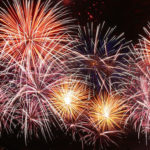 I’ve never been much of a risk-taker. On the 4th of July I’ve always stuck to sparklers and snap pops, leaving the more dangerous – albeit admittedly more exciting – fireworks to first my dad, then my friends, and now the professionals. And that was before I’d listened to my father-in-law’s stories about his very first on-call shift in the emergency room (he’s an ENT), which happened to fall on a 4th of July. The fireworks-related injuries he saw in just those few hours made enough of an impact that since that day he has never used fireworks again.
I’ve never been much of a risk-taker. On the 4th of July I’ve always stuck to sparklers and snap pops, leaving the more dangerous – albeit admittedly more exciting – fireworks to first my dad, then my friends, and now the professionals. And that was before I’d listened to my father-in-law’s stories about his very first on-call shift in the emergency room (he’s an ENT), which happened to fall on a 4th of July. The fireworks-related injuries he saw in just those few hours made enough of an impact that since that day he has never used fireworks again.
According to the United States Consumer Product Safety Commission (CPSC), in 2010 approximately 8,600 people ended up in emergency rooms due to injuries – primarily burns and lacerations to the hands, legs, and eyes – involving both legal and illegal fireworks. Three fatalities were also reported during the same period.
According to the National Fire Protection Association 2009 figures, fireworks caused an estimated 18,000 fires, and these fires resulted in one death, 30 injuries, and $38 million in property damage.
So PLEASE, if you plan to include fireworks in your 4th of July celebrations, make sure you celebrate safely by following these guidelines, courtesy of the National Council on Fireworks Safety:
• Only use fireworks outdoors.
• Obey local laws. If fireworks are not legal where you live, do not use them.
• Always have water – a hose or bucket – handy.
• Only use fireworks as intended. Do not try to alter or combine them.
• Do not use homemade fireworks or illegal explosives. Report illegal explosives to the fire or police department.
• Never relight a “dud” firework. Wait 20 minutes and then soak it in a bucket of water.
• Soak spent fireworks with water before placing them in an outdoor garbage can.
• Use common sense. Spectators should keep a safe distance from the shooter and the shooter should wear safety glasses.
• Alcohol and fireworks do not mix. Have a “designated shooter”.
• Closely supervise teens around fireworks, and never allow young children to handle or use fireworks.
And a few special safety tips for using sparklers:
• Remain standing while using sparklers.
• Never hold a child while using sparklers.
• Never hold or light more than one sparkler at a time.
• Never throw sparklers.
• Drop spent sparklers in water – the wire and stick remain hot long after the flame has gone out.
• Teach children not to wave sparklers near other people or run while holding sparklers.
I’d also recommend downloading the brand new American Red Cross app, which will allow you to immediately access, among other things, valuable information how to treat burns and lacerations should the need arise.
Happy 4th of July!
